Our Curriculum
Our Mission is to develop children who:
Our curriculum has been developed to create children who Let Their Lights Shine by being:
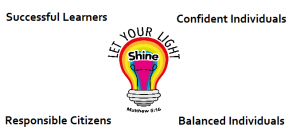
Successful Learners:
Confident Individuals:
Responsible Citizens:
Balanced Individuals:
This is the philosophy of how we want to work and learn. These aims underpin all the learning that takes place in our school. Each strand has clear focuses to ensure we develop the whole child and we intent pupils to have a wide range of experiences that add to their overall character.
Explore each strand in greater detail below:
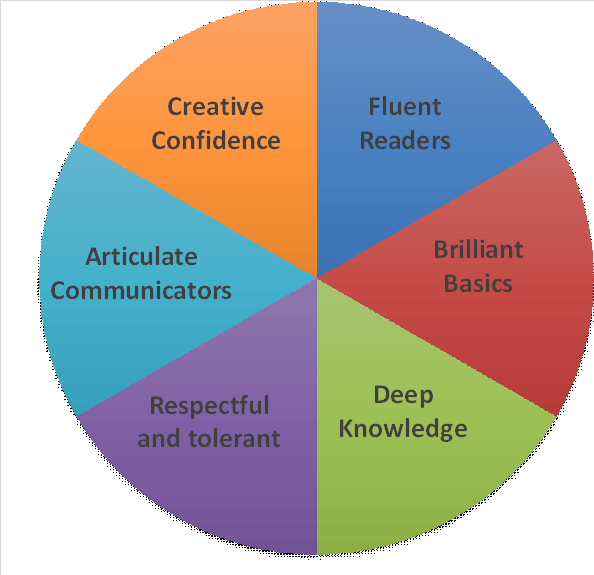
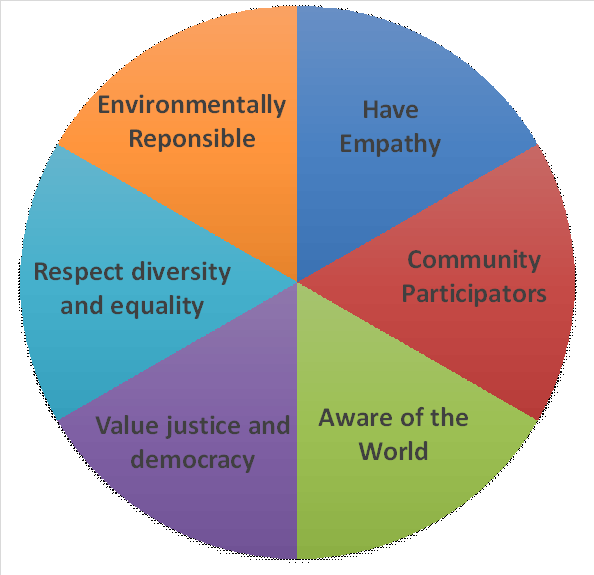
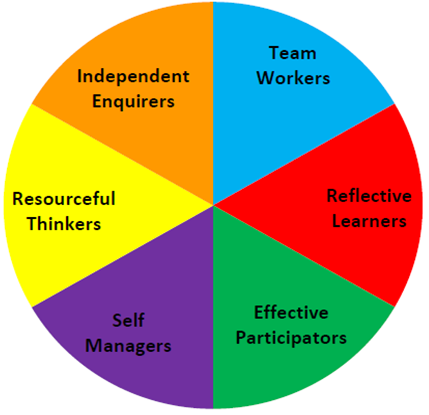
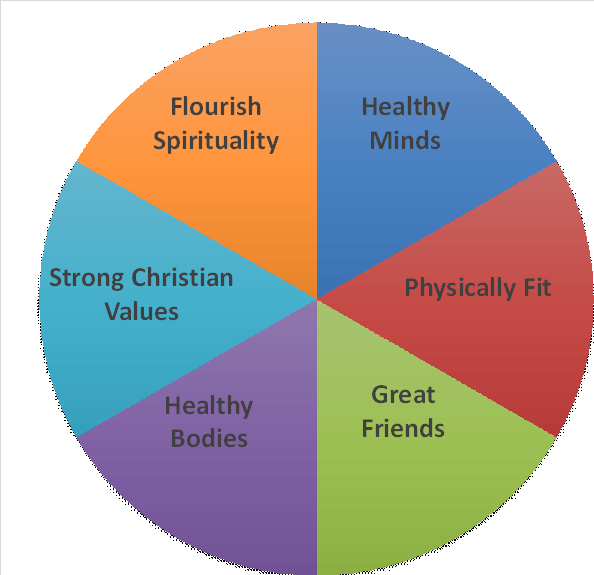
As a whole school, we provide a subject based, broad, and creative curriculum. Each subject discipline has a clear progression of the knowledge that is to be taught and teaching strategies are chosen carefully to ensure that this knowledge is embedded, practiced, and retained.
Learning is linked together through the use of curricular vehicles to ensure that children have a coherent understanding of the connections that should be made between subjects and how knowledge is transferable.
If you would like any further information on our curriculum please contact the School Office and we will happily share further information.
“You can make anything by writing.” – C.S.Lewis
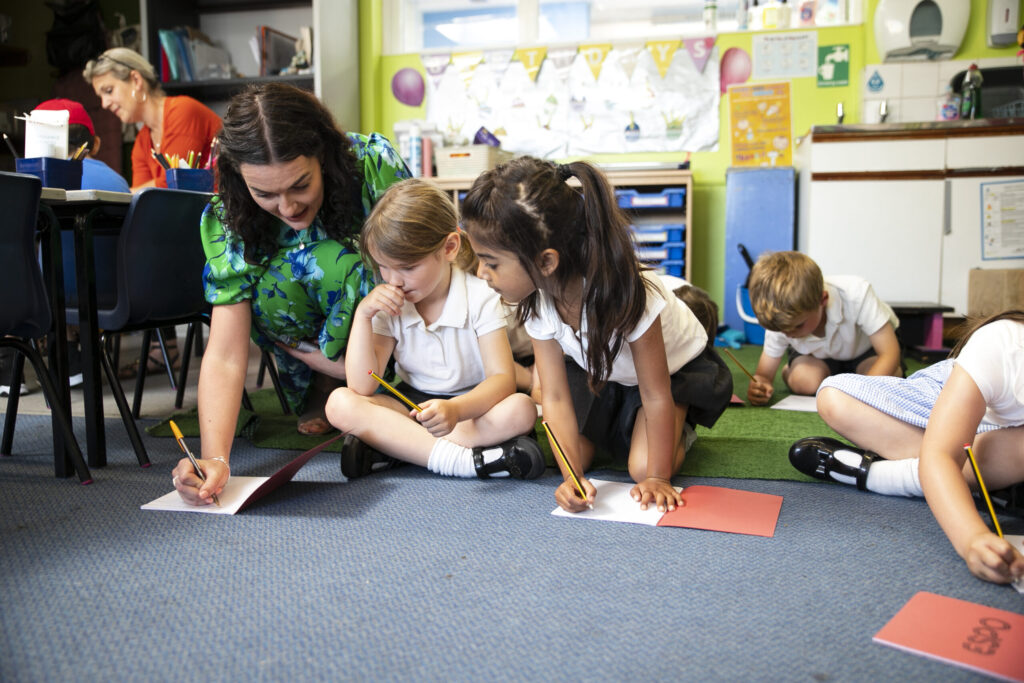
Intent
At Kibworth CE Primary we aim for our children to become independent and creative writers. We encourage them to write clearly and with confidence over a range of genres, for specific audiences and purposes. Throughout their writing, we place great value on the importance of accurate grammar, punctuation and spelling as well as the development of correct letter formation and neatly presented handwriting. Through our English curriculum, we aim to nurture in the children a love of literature and language, and the confidence to continue write throughout their lives.
Implementation
Within our school, writing is taught daily in English lessons as well as being consolidated throughout the wider curriculum (such as history, geography, and science). Our writing curriculum is organised into three key areas: transcription, composition and grammar and punctuation. End of year expectations sheets are used to inform planning and teaching; ensuring pupils learn, develop, revisit, and consolidate these skills throughout the year. The statements outlined in the National Curriculum are used alongside these to ensure pupils receive a broad and balance writing curriculum.
Transcription
This area of learning covers both spelling and handwriting. A structured programme of spelling extends across the whole school, beginning with phonics in EYFS and Key Stage 1 (see phonics page for further information). At the end of KS1, there is a natural transition to the Support for Spelling programme into the beginning of Key Stage 2; this continues to be used through to the end of Year 6. As a school, we follow a cursive handwriting scheme, which is first introduced in EYFS. Children are taught to use the correct letter formation, sizing and joins and are expected to apply this within all of their written work.
Composition
Throughout each term children will be exposed to fiction and non-fiction texts and learn to create writing in both styles. Each year group has a literacy overview for the year which ensures writing for a variety of purposes (entertaining, informing, persuading, discussing) are covered through a range text types throughout the school. Each writing unit will incorporate a variety of teaching and learning strategies such as: use of an engaging stimulus, planning around a focus text/exposure to high quality texts, setting a clear audience and purpose, explicit teaching of specific skills and opportunity for modelled and shared writing. At the end of a unit, children will independently apply their taught skills, within an extended piece of writing, and have the opportunity to edit and publish this final outcome.
Grammar and Punctuation
Correct grammar and punctuation are crucial building blocks for children learning to speak, write, and listen. Having a good knowledge of grammar allows our child to communicate their ideas and feelings and helps them choose the right language when writing. Within English lessons, children are taught the grammar and punctuation appropriate to their age and should have a growing bank of terminology and understanding which they are then able to apply accurately into their written work. Stand-alone grammar lessons are also taught within upper KS2 to consolidate and secure previous learning.
Impact
Throughout our units of work, we give our children a wide range of opportunities in which to develop their writing skills to show progress throughout the year. Children’s progress will be monitored using informal assessment i.e., observations, marking of work and questioning children to identify what they have understood. The writing outcomes that children produce at the end of each unit is used as an assessment tool for teachers to track which skills have been applied correctly and areas for development.
Each pupil has an independent writing portfolio which is built up throughout the year. This is a collection of their end of unit writing outcomes which are published and celebrated. Our ‘Writing Wall’ also displays a range of selected writing from across the school; showcasing pupils’ written work that has exceeded their previous achievements and celebrating their learning.
Key Documents
‘I do believe that something very magical can happen when you read a good book.’ – J K Rowling
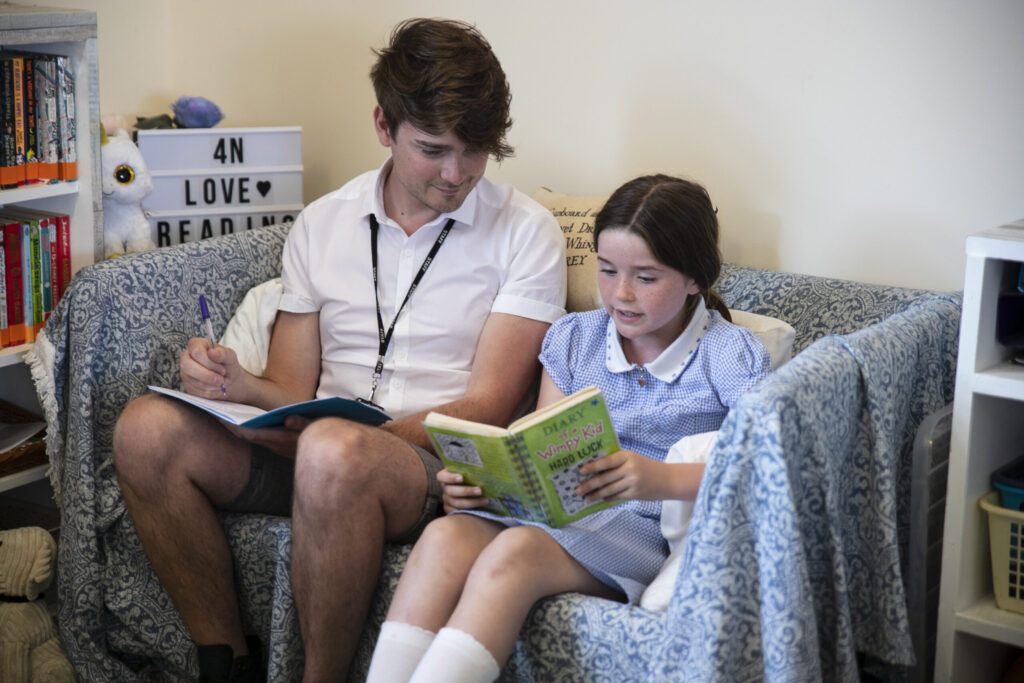
Intent
At Kibworth, we believe that reading is at the heart of everything we do and is an essential skill that provides access to wealth of opportunities and opens the door to a rich a broad curriculum. Our intent at Kibworth CE Primary school is to ensure that all pupils are fluent and effective readers who have a rich vocabulary and enjoy reading for pleasure. It is vital that children acquire good reading skills access the information that will support their learning in all areas. We achieve this through the high quality teaching of reading to secure fluency and a good level of comprehension. This, underpinned by a culture that promotes a love of reading, ensuring that our children become articulate and literate individuals who have a positive attitude towards reading.
We aim to:
Implementation
Children must learn to read before they can read to learn. The teaching of early reading and phonics focuses on developing children’s phonetic skills in order to segment and blend to develop fluent readers through following the principles and practices of letters and sounds.
Once children have gained a secure phonetical knowledge, they need to become fluent readers. This means that they must be able to recognise words automatically to use appropriate expression and intonation and read at a natural pace. A range of fluency strategies (e.g. echo reading, emphasis sentences and speed reading) allows children’s fluency to be developed.
Comprehension is a vital component of becoming a fluent and effective reader and is an important part of our curriculum taught from EYFS through to Year 6. Children work on a range of high-quality texts as a class to develop their reading skills based on our High-Five reading characters. Within English lessons, a range of rich reading experiences are offered linked to the topic being studied and children are encouraged to appreciate language choice and writing techniques to emulate in their own writing.
Impact
At Kibworth CE Primary School, we strive to make sure every child fulfils their potential by meeting their individual learning needs. Although every child is different and will be successful in different areas, the knowledge progression document outlines what we aim to ensure children will achieve.
Key Documents
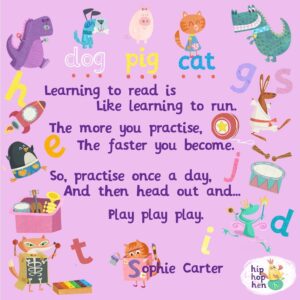
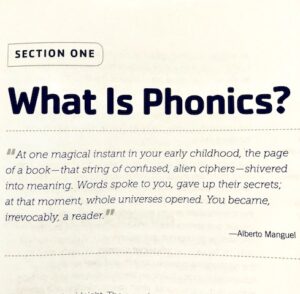
Intent
Through the teaching of effective phonics at Kibworth C of E we want our children to become confident and fluent readers as well as supporting them in developing a love/pleasure of reading.
By giving children the best possible phonics teaching, this enables them to grow into efficient readers and opens the doors to all learning. The more children can read the more they learn and want to learn.
Implementation
Phonics is taught in Foundation Stage through to Year 2 but the journey to reading begins right from birth when babies listen and hear sounds. They then start to copy words verbally before starting at pre-school where they tune into different sounds musically and physically. This is where phase 1 phonics starts, and children begin to hear different sounds and put them together orally. This is known as oral blending and then they start to chop words into sounds before starting their learning of individual sounds.
Once children have learnt some sounds, they begin to put them together to blend and they segment them to spell. Within each phase of phonics children learn high frequency words (common words that appear in books) and tricky words which cannot be sounded out. The more of these words children know by sight the more fluent and confident their reading will become.
Impact
Children’s progress in phonics is regularly assessed through everyday observations and listening to their reading. Children are assessed at the end of each phase or if there are concerns so any gaps can be highlighted and worked on. Copies of phonics assessments are sent home so parents can support their child on anything they are unsure of. This information is also passed onto the next class teacher during transition.
In the summer term of Year 1 there is a national phonics test where children have to read 40 real and alien words to check their understanding of phonics. This score is sent off and a copy is sent to parents.
Key Documents
Tricky Words by Phase and Term
Programme Overview Reception and Year 1
Little Wandle Handwriting Formation
Click Here to Access Little Wandle
The resources on this page will help you support your child with saying their sounds and writing their letters. There are also some useful videos so you can see how they are taught at school and feel confident about supporting their reading at home.
‘Of all the life skills available to us, communication is perhaps the most important’ Brett Morrison
Intent
At Kibworth CE Primary we aim for our children to become articulate communicators by being creative and confident. We encourage them to speak clearly and with confidence over a range of genres and for specific audiences and purposes. Within the oracy curriculum, we place great value on the importance of speech and language as well as pronunciation and grammar. We aim to nurture the children with a love of speaking and give them the confidence to continue to perform, persuade and present throughout their lives.
Our school’s curriculum intent is to produce children who are fluent readers and articulate communicators. We aim to ensure that every child can communicate confidently in a range of forms and situations.
Implementation
In Foundation stage, oracy is a fundamental aspect of how children communicate and listen to each other and adults. They explore this through different aspects including asking and answering questions, following instructions and participating in class discussions. The children are exposed to a high standard of skills that help to promote these skills early on in their life. Cross-curricular links are also made to other subjects so that pupils can develop, improve and apply their oracy skills.
Across both key stages they follow six different strands which is embedded and taught discreetly, where appropriate. The table below shows how these strands fit in to help our children to become articulate communicators.
Each aspects of learning is taught and developed during the children’s time at the school through a variety of subjects which have been adapted from the National Curriculum 2014. Cross-curricular links are also made where possible to enhance children’s speaking and listening skills.
How do we teach it?
Teachers identify the most appropriate teaching strategies to best suit the particular learning situation and ensure that they identify the most appropriate and engaging method for the learning to be carried out.
There are many ways that teaching is effective, and our school aims to encourage our children to become articulate communicators by being creative and confident. Lessons with an oracy focus are likely to include a range of the following:
Impact
Throughout the different units of work, our children are provided with a range of different opportunities which help to develop their oracy skills. This shows progress throughout the year and the children build upon previously taught skills to become more confident and more articulate when communicating. Children also have the opportunity to recap previously taught skills, learn new skills and grow in confidence as they transition from year to year.
Key Documents
“Life is a math equation. In order to gain the most, you have to know how to convert negatives into positives.”
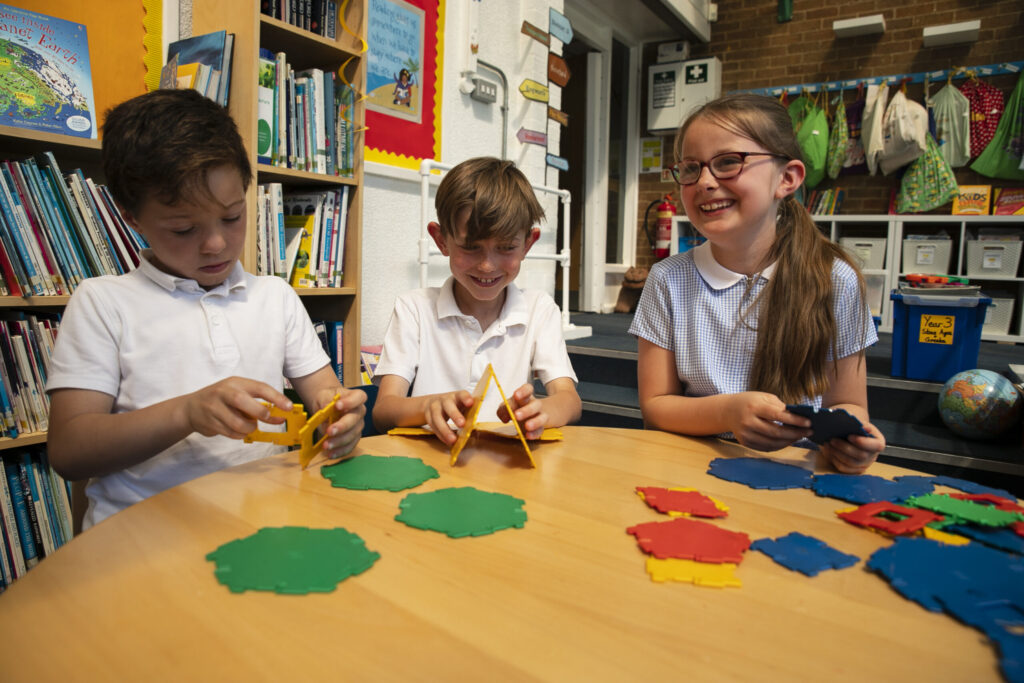
Intent
Developing Mastery
We are committed to ensuring that all pupils achieve mastery in the key concepts of mathematics, appropriate for their age group, in order that they make genuine progress and avoid gaps in their understanding that provide barriers to learning as they move through education. Our Mathematics curriculum reflects a greater emphasis on mastery of the key skills of mathematics to ensure children have adequate time to develop their fluency, reasoning, and deeper understanding before moving onto a new concept. Assessment for Learning, an emphasis on investigation, problem solving and the development of mathematical thinking and a rigorous approach to the development of teacher subject knowledge are therefore essential components to the school’s approach to this subject.
Aims and Purposes of Maths – Let your Light Shine
Children should:
Implementation
Planning, Teaching and Management
The Foundation Stage
Maths is taught as part of the Area of Learning designated as ‘Mathematics’ in the EYFS Curriculum. The EYFS Curriculum is made up of two strands: Numbers and Shape, Space and Measure. The children will receive some whole class and adult led maths teaching and they have access to independent child-initiated maths activities daily. Children are given opportunities to work on maths activities both indoors and outdoors. These activities are planned based on the main areas as outlined in the EYFS curriculum. EYFS staff also provide opportunities for the children to work on their maths targets both independently and as guided groups. As in the rest of the school, the Maths planned builds on previous learning and allows time for children to develop ‘mastery’ in the key areas of Mathematics without moving onto a new concept too quickly.
Planning is updated daily taking into account previous learning. This ensures the maths activities are appropriate and relevant to the children’s learning needs and their interests. Maths activities in Continuous Provision are planned taking into account both the children’s interests and curriculum coverage.
Key Stage 1 and 2
Planning
The New National Curriculum has several strands
Planning Key Stage 1 and 2
Short term plans are produced weekly by individual class teachers. These plans include opportunities to review, teach, practise, and apply skills in all strands. Additionally short-term plans include opportunities to work on non-negotiable end of year targets and develop the children’s arithmetic skills.
Teaching
Key Stage 1
In Key Stage 1 children have a daily mathematics lesson of approximately 60 minutes. Teachers in Key Stage 1 also plan and provide opportunities for children to use and apply maths knowledge and skills in other areas of the curriculum.
A typical lesson in Key Stage 1 consists of 3 main components. The timing and organisation of each component within a maths lesson may vary.
This will involve whole-class or same ability group work to rehearse, sharpen and develop mental and oral arithmetic maths skills.
A short teaching input and lots of opportunities for pupils to calculate the problem or practise the skill, which will the use of CPA, between whole class, paired, grouped and individual work.
These are a vital part of every maths lesson. It involves work with the whole class or small groups to identify and deal with misconceptions, summarise key facts and ideas, make links to other work and evaluate learning and progress and discuss next steps.
Key Stage 2-
In Key Stage 2 children have a daily mathematics session of approximately 60 minutes. Teachers in Key Stage 2 also plan and provide opportunities for children to use and apply maths knowledge and skills in other areas of the curriculum.
A typical lesson in Key Stage 2 consists of 3 main components. The timing and organisation of each component within a maths lesson may vary.
This will involve whole-class or same ability group work to rehearse, sharpen and develop mental and oral arithmetic maths skills.
This will involve both teaching input and pupil activities with a balance between whole class, grouped, paired and individual work.
These are a vital part of every maths lesson. It involves work with the whole class or small groups to identify and deal with misconceptions, summarise key facts and ideas, make links to other work and evaluate learning and progress and discuss next steps.
Investigative Maths
Where appropriate within the learning journey, the children will be given the opportunity to solve/investigate problems in maths during a ‘BIG Maths/Investigative Maths’ lesson. It is an important part of the children’s mathematical learning as the 2014 National curriculum states-
‘The national curriculum for mathematics aims to ensure that all pupils…..become fluent……reason mathematically….. and can solve problems.’
Therefore, at Kibworth through ‘Investigative Maths’, the teachers want to ensure all children will,
These will be planned and will included a variety of skills-
In years 2 to 6, opportunities will be given to develop more open-ended differentiated types of problems, which will have greater potential for stimulating higher order mathematical thinking. This will ensure all children will be involved in searching for patterns and relationships between elements in the problem set.
Impact
Assessment
Class teachers are responsible for assessing individual children’s attainment in maths in line with the school’s Assessment and Recording policy. Progress is reported to parents at least annually.
Maths assessment happens in 2 forms:
The data from formative assessments is used to judge children’s attainment at the end of each term or year.
Foundation Stage
Teachers continually update children’s ‘Learning Journeys’ with observations, photographs, and work samples in their journals, which details the children’s progress in maths. In addition, this is also recorded on the on line assessment tool, called, Tapestry.
‘Looking for Learning’ in maths
Children are also expected to assess their own learning in maths. This can take different forms depending on the age and ability of the children.
Foundation Stage
Children are also encouraged to self-assess, through a visual display, ‘Road to Success/Learning Line’ and the children move their car on the road to success or place it in the appropriate coloured box, depending on their confidence level. The boxes are coloured in line with the RAG (red, amber, green) scheme.
Key Stage 1 and 2
Children articulate their understanding through, ‘looking for learning’ terminology to express how they feel about the skill been taught in maths. They are encouraged to confidently express how they mastered the skill or why they are treading water or drowning. In Key Stage 2 children also record their thoughts in purple in their maths books and peer mark other pupils work.
Expectations
All pupils should be working at age related or above for each year group.
Please see attached Appendices.
Key Documents
“The way a child discovers the world constantly replicates the way science began. You start to notice what’s around you, and you get very curious about how things work. How things interrelate. It’s as simple as seeing a bug that intrigues you.” – David Cronenberg.
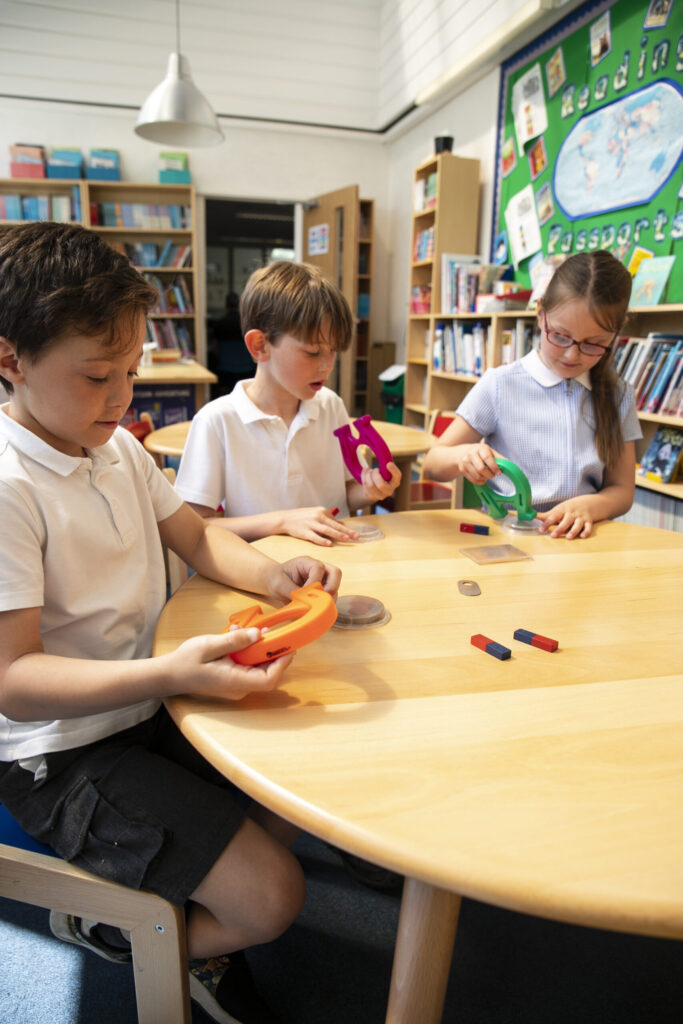
Intent
How does it link to our curriculum vision?
what is the scope of learning?
What do we intend children to learn?
Science stimulates pupil’s curiosity, develops their sense of enquiry and their understanding of the world around them. Children learn to work as scientists, planning and undertaking practical investigations on their own and with others. They combine their personal experiences with the scientific knowledge they learn which enable them to develop an understanding of key scientific ideas and how the world works and develop a sense of curiosity about natural phenomena.
Implementation
How is the teaching of the subject organised?
At Foundation level, Science is an integral part of topic learning and should be embedded throughout activities. At this stage, the ‘understanding the world’ area of learning commands at least one hour of structured time per week and is evident throughout other learning tasks. Cross-curricular links will also be made to other subjects so that pupils can develop and apply their scientific skills.
Across both key stages the scientific context can be taught either discreetly or as part of a topic where appropriate.
The programmes of study for science are set out year-by-year for key stages 1 and 2. Schools are, however, only required to teach the relevant programme of study by the end of the key stage. Within each key stage, schools therefore have the flexibility to introduce content earlier or later than set out in the programme of study. ‘Working scientifically’ specifies the understanding of the nature, processes and methods of science for each year group and should not be taught as a separate strand. This element should be embedded throughout the delivery of the Science curriculum.
Each unit of learning is taught and developed during the children’s time at the school through a variety of science topics which have been adapted from the National Curriculum 2014. Cross-curricular links are also made where possible to enhance the learning of science.
How do we teach it?
Teachers identify the most appropriate teaching strategies to best suit the particular learning situation and ensure that they identify the most appropriate, engaging and safe method for the learning to be conducted.
There are a variety of ways in which the teaching may be effective, and our school aims to encourage learning through investigation, with an emphasis on first-hand experience. Science lessons are likely to include a range of the following…
Impact
How do we know how well children are doing?
Children’s progress is monitored by using informal assessments i.e., observations, marking or work and questioning children to identify what they have understood and is they have any misconceptions. Children will also participate in low stakes quizzes giving them the time and opportunity to remember what they have learnt, and this will also aid their retention of learning.
Key Documents
“Those who can imagine anything, can create the impossible.”― Alan Turing
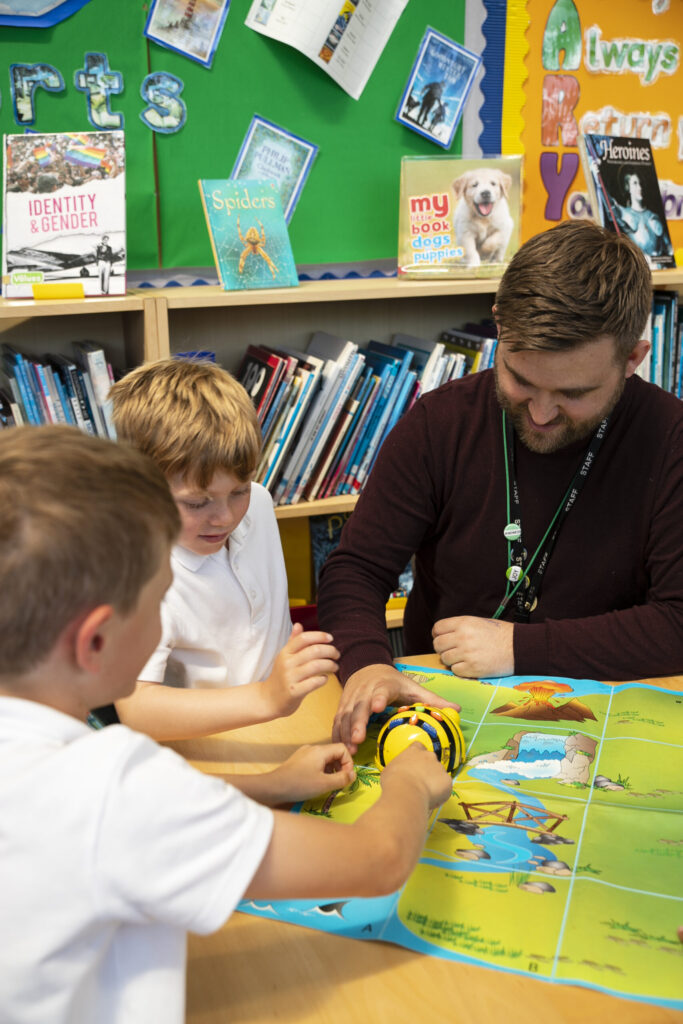
INTENT
We believe that technology is an essential part of the curriculum; computing is not just a subject on its own; it is a subject that plays an important role throughout the whole curriculum. Through the study of Computing, children will be able to develop a wide range of fundamental skills, knowledge and understanding that will actually equip them for the rest of their life. Computers and technology are such a part of everyday life that our children would be at a disadvantage if they are not exposed to a well thought out computing curriculum. We believe that children must be taught in the art form of ‘Computational Thinking’ in order to provide them essential knowledge that will enable them to participate effectively and safely in the digital world beyond our gates.
IMPLEMENTATION
Our children in Early Years provision will be exposed to the understanding of internet safety as they explore the world around them and how technology is an everyday part of their learning and understanding of the world.
In Key Stage 1 the children are taught a computing scheme of work in which they will learn to understand what algorithms are; how they are implemented as programs on digital devices; and that programs are executed by following precise and unambiguous instructions. They will be taught to create and debug simple programs and use logical reasoning to predict the behaviour of simple programs. They will be shown how to use a range of technology purposefully to create, organise, store, manipulate and retrieve digital content as well as recognise common uses of information technology beyond school. They are taught to use technology safely and respectfully, keeping personal information private; identify where to go for help and support when they have concerns about content or contact on the internet or other online technologies.
In Key Stage 2 the children continue to be taught using the computing scheme of work in which they will design, write, and debug programs that accomplish specific goals and solve problems by decomposing them into smaller parts. They will use sequence,
selection, and repetition in programs, use logical reasoning to explain how some simple algorithms work and correct errors in algorithms and programs. Children will be taught to understand computer networks, including the internet, and the opportunities they offer for communication and collaboration. They will use search technologies effectively, learn to appreciate how results are selected and ranked, and be discerning in evaluating digital content. They will use technology safely, respectfully, and responsibly; recognise acceptable/unacceptable behaviour; identify a range of ways to report concerns about content and contact. Software and hardware.
Other hardware such as microphones, video cameras, bee bots, pro bots and o bots are available to enrich the teaching of computing.
IMPACT
After the implementation of this computing curriculum, children will be digitally literate and able to join the rest of the world on its digital platform. They will be equipped, not only with the skills and knowledge to use technology effectively and for their own benefit, but more importantly – safely. The biggest impact we want on our children is that they understand the consequences of using the internet and that they are also aware of how to keep themselves safe online. As children become more confident in their abilities in Computing, they will become more independent and key life skills such as problem-solving, logical thinking and self-evaluation become second nature.
Key Documents
“There is no religion that teaches anger or hatred” – The Dalai Lama
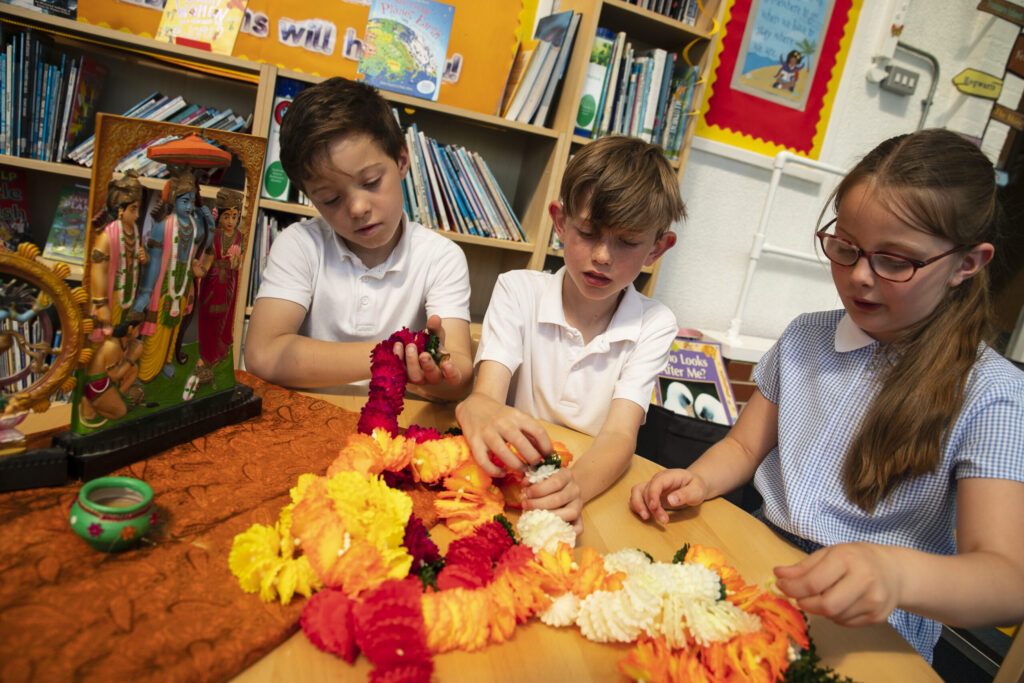
Our R.E. curriculum is underpinned by Christian values and aims to inspire all our children in their learning. The curriculum enables children to explore, discover, flourish, and let their light shine. Our broad and balanced curriculum provides opportunities to link knowledge and skills across areas of learning. The R.E. curriculum intends to promote religious understanding and respect, and to challenge prejudice, discrimination, and stereotyping. We strongly believe that the purpose of RE is about religious literacy. This means we aim for children to be able to hold a balanced and well-informed conversation about religion and belief. We do this by exploring and asking questions.
IMPLEMENTATION
RE is taught in accordance with the Leicestershire Revised Syllabus for Religious Education. It is supplemented by understanding Christianity. Using this blended approach ensures that pupils develop their knowledge and understanding following similar strands throughout school, which allows them to build upon and make connections in their learning. Our curriculum is enriched with experiences which celebrate the opportunities in our local area. As a voluntary aided School with a strong Christian ethos, each year group focuses on Christianity with the opportunity for pupils to learn about and evaluate their own views on this and other world religions. RE enables pupils to appreciate their own and others’ beliefs and cultures, helping them to develop a clear understanding of the significance of religion in their own area as well as in the world today. It is concerned with the promotion of each pupil’s self-worth, enabling them to reflect on their uniqueness as human beings, to share their feelings and emotions with others and to appreciate the importance of forming and maintaining positive relationships. We teach R.E. discreetly in both Key Stage 1 and 2 for an hour each week. In Early Years, the opportunities for learning are interwoven around the children’s own life experiences and are linked to learning about an awareness of similarities and differences and celebrating each other’s cultural diversity.
IMPACT
Teaching R.E. makes a significant contribution to pupils’ academic and personal development. It also plays a key role in promoting social cohesion and the virtues of respect and empathy, which are important in our diverse society.
We want the R.E. curriculum to impact on the children in the following ways:
Key Documents
‘Geography explains the past, illuminates the present and prepares us for the future.’ – Michael Palin
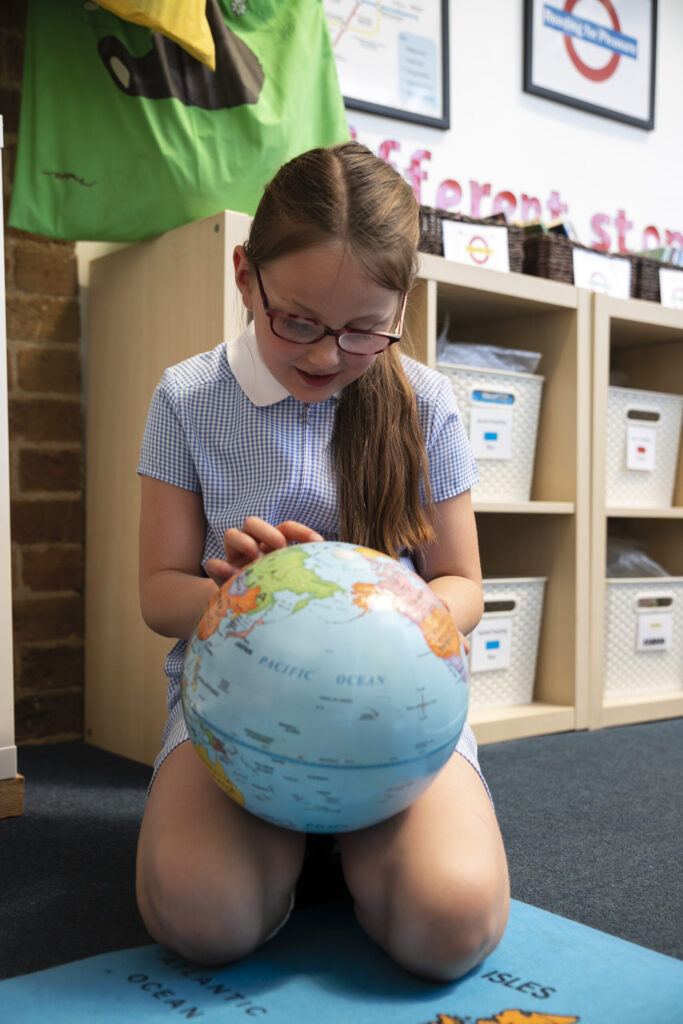
‘It seems that the natural world is the greatest source of excitement; the greatest source of visible beauty; the greatest source of intellectual interest. It is the greatest source of so much in life that makes like worth living’ – David Attenborough
Intent
Through the teaching of Geography at Kibworth Primary school, we aim to ensure our geographers are equipped to deal with the demands of the 21st century and become lifelong learners.
The geography curriculum at Kibworth Primary School aims to inspire a curiosity and fascination about the world and its people that will remain with the children for the rest of their lives. We intend to encourage all children to develop a critical understanding of the diverse places, people, resources, and natural and human environments, together with a deep understanding of the Earth’s key physical and human processes. As pupils progress, their growing knowledge of the world will help them to deepen their understanding of the interaction between humans and the physical environment around them, and of the formation and use of landscapes and environments. Geographical knowledge, understanding and skills provide the frameworks and approaches for children to build upon in order to explain how the Earth’s features at different scales are shaped, interconnected and changed over time.
Implementation
Our geographers start their journey in Foundation Stage, where they begin to make sense of the physical world and their community. They are encouraged and guided to explore, observe, and find out about people, places, and the environment. They are taught to recognise similarities and differences in relation to people, objects, materials and living things. They are expected to be able to talk about the features of their own immediate environment and how their personal environments may vary from one another.
Throughout Key Stage 1 and Key Stage 2 children are encouraged to explore and investigate their locality, the United Kingdom, and the world. They continue to develop a broad understanding and use of key geographic vocabulary and explore a range of the world’s most significant human and physical features. Children are encouraged to appreciate how humans have used the environment with both positive and negative effects and to educate themselves on how this will impact life in the future.
Impact
Children’s progress is monitored by using informal assessments such as observations, marking of work and questioning, to identify what they have understood. This is tracked by the class teacher, who records which children are working towards age related expectation and those working above. These assessments are made termly, and this information is then relayed to the next year group during transition. Pupil voice also plays an essential role in measuring the impact of our geography curriculum across the school. Through pupil interviews, children can reflect on what they have learnt and its impact on our world today. These work together cohesively to evaluate standards in History across the school
Key Documents
‘We are made by History’. – Martin Luther King Junior.
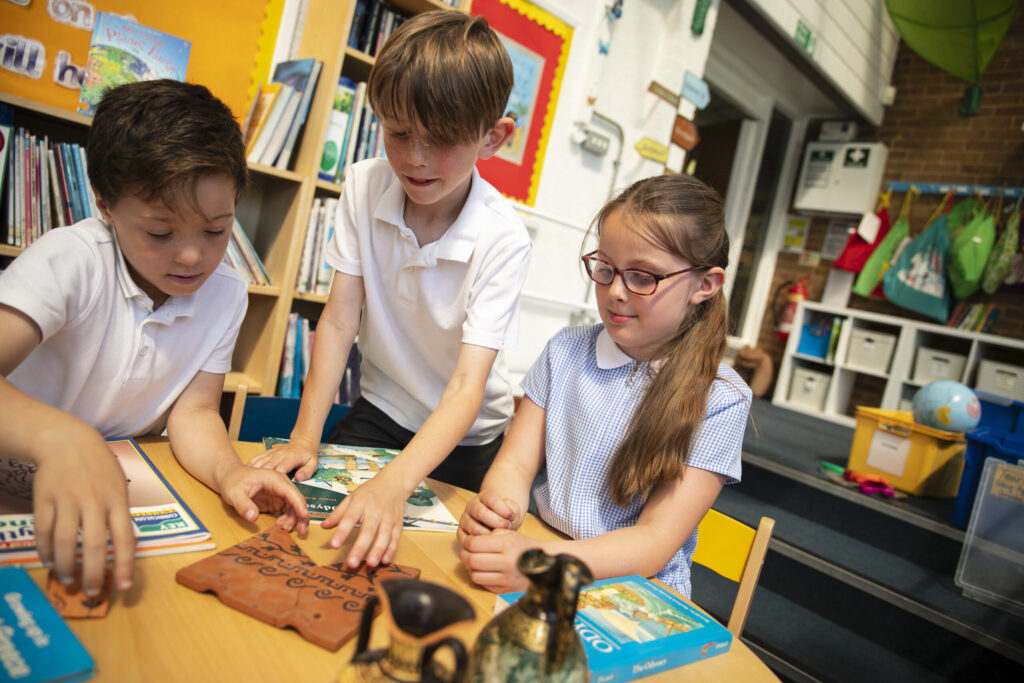
‘The more you know about the past, the better prepared you are for the future’. – Theodore Roosevelt.
Intent
Through the teaching of History at Kibworth Primary School, we aim to ensure the children let their light shine by equipping them to deal with the demands of the 21st century and by becoming lifelong learners. They show this throughout the school by:
The History education at Kibworth Primary School provides the foundations for pupils to gain a coherent knowledge and understanding of Britain’s past and that of the wider world. It inspires pupils’ curiosity to know more about the past. The teaching and learning of History equips pupils to ask perceptive questions, follow lines of enquiry, think critically, weigh evidence, sift arguments, and develop perspective and judgement. History helps pupils to understand the complexity of people’s lives, the process of change, the diversity of societies and relationships between different groups, as well as their own identity and the challenges of their time.
Implementation
Our historians start their journey in the Foundation Stage and begin to explore vocabulary linked to time and chronological order within their own lives to help them understand the world.
Across Key Stage One and Key Stage Two the children follow lines of enquiry to encourage them to research and explore a key aspect of their history topic. The skills and knowledge needed to be a historian are taught progressively across the year groups through the key themes of chronology, aspects of life, legacy (achievements) and local history. The children will also look at a diverse range of significant historical figures, linked to their history topics.
Impact
Children’s progress is monitored by using informal assessments such as observations, marking of work and questioning children to identify what they have understood. This is tracked by the class teacher, who records which children are working towards age related expectations and those working above. These assessments are made termly, and this information is then relayed to the next year group during transition. Pupil voice also plays an essential role in measuring the impact of our history curriculum across the school. Through pupil interviews, children can reflect on what they have learnt and its impact on our world today. These work together cohesively to evaluate standards in History across the school
Key Documents
“Art enables up to find ourselves and lose ourselves at the same time” – Thomas Merton
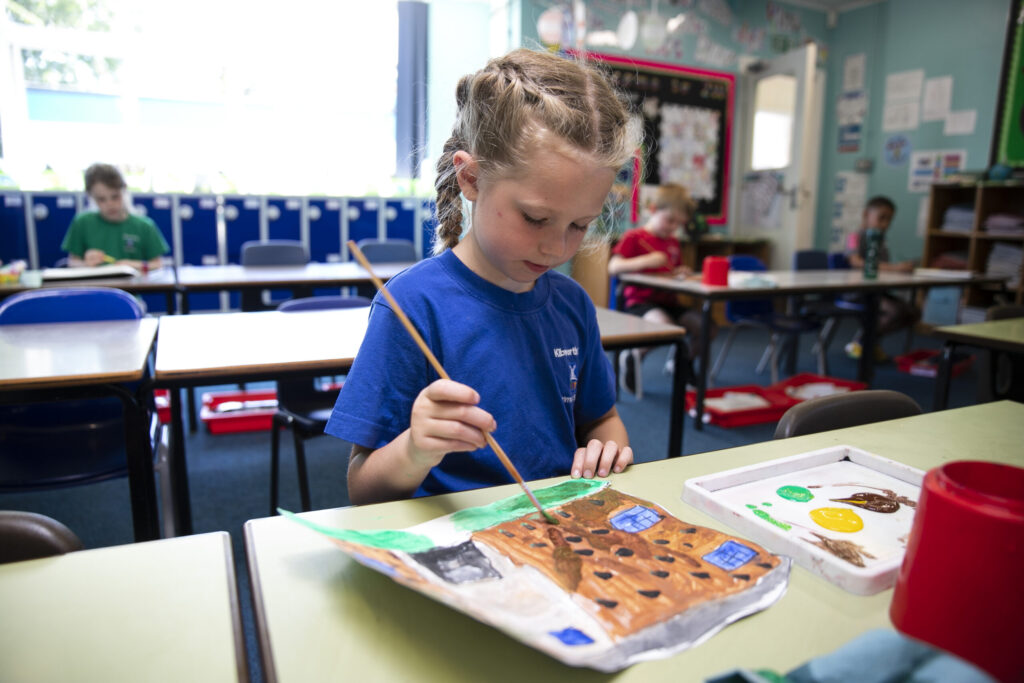
Intent
Kibworth CE Primary enables pupils to become involved in, enjoy and appreciate the visual arts and discover how it can enrich their personal lives. Art and Design contributes to the development of the whole child emotionally, aesthetically, physically, socially, and cognitively. We believe that every child at Kibworth has the potential to be an artist. Across their primary years, children explore and learn that art and design plays in their own and others’ lives, in contemporary life and in different times and cultures. They are taught confident and strong skills within the core elements of Fine Art: painting and drawing. During their phases, the children are also introduced to, and taught elements of, other areas of art such as: printing, textiles, 3-D sculpture, and mixed media. This provides all children with the opportunity to express themselves imaginatively, creatively and respond to the world around them artistically whilst developing their knowledge and understanding of various Art and Design elements.
Implementation
Art and Design is taught by the children’s class teacher with pupils exposed to many visual, tactile, and sensory experiences. It is taught across a series of lessons, as part of the children’s topic learning journey, with a focus on a particular area (drawing, painting or one other, following the Art Curriculum map). At Kibworth CE Primary we also seek opportunities for children to work with professional artists, including subject specialists from our trust. As well as an Art and Design Subject Leader, we have a Creative Team of staff at Kibworth to support the teaching and development of: Fine Art, Dance, Drama and Music across the school.
Impact
Children in EYFS and Key Stage 1 record their artwork in a sketchbook, allowing children and teachers to acknowledge their progress across the phase.
Children in Key Stage 2 display their art per topic upon an A1 piece of card, which is then collected within a folder, collated across the years. On-going formative assessments are made by the class teacher.
Key Documents
“Art enables up to find ourselves and lose ourselves at the same time” – Thomas Merton
Intent
Kibworth CE Primary enables our artists to become involved in, enjoy and appreciate the visual arts and discover how it can enrich their personal lives. Art and Design contributes to the development of the whole child emotionally, aesthetically, physically, socially, and cognitively. We believe that every child at Kibworth has the potential to be an artist. Across their primary years, our artists explore and learn that art and design plays in their own and others’ lives, in contemporary life and in different times and cultures. They are taught confident and strong skills within the core elements of Fine Art: painting and drawing. During their phases, the children are also introduced to, and taught elements of, other areas of art such as: printing, textiles, 3-D sculpture, and mixed media. This provides all artists with the opportunity to express themselves imaginatively, creatively and respond to the world around them artistically whilst developing their knowledge and understanding of various Art and Design elements.
Implementation
Art and Design is taught by the children’s class teacher with our artists exposed to many visual, tactile, and sensory experiences. It is taught across a series of lessons, as part of the children’s topic learning journey, with a focus on a particular area (drawing, painting or one other, following the Art Curriculum map). Our artists begin their art learning journey by studying the artwork of a famous artist, using this to inform and inspire techniques used and their own final piece. At Kibworth CE Primary we also seek opportunities for children to work with professional artists, including subject specialists from our trust. As well as an Art and Design Subject Leader, we have a Creative Team of staff at Kibworth to support the teaching and development of: Fine Art, Dance, Drama and Music across the school.
Impact
At Kibworth, we enjoy celebrating our artists achievements. Showcases, exhibitions and festivals are hosted, allowing every artist to celebrate and share their work with other year groups, parents, carers, and teachers across our school throughout the year. School displays are regularly updated to ensure every year group has this opportunity to display their work also. Artists in EYFS and Key Stage 1 record their artwork and learning journey in a sketchbook, allowing the child and teacher to acknowledge their progress as an artist across the phase. Artists in Key Stage 2 display their art per topic upon an A1 piece of card, which is then collected within a folder, collated across the years. Their art learning journey is recording within their Topic journey. On-going formative assessments are made by the class teacher regularly.
Key Documents
Personal, Social, Health and Economic (PSHE) education is a school subject through which pupils develop the knowledge, skills and attributes they need to manage their lives, now and in the future. These skills and attributes help pupils to stay healthy, safe and prepare them for life and work in modern Britain. When taught well, PSHE education helps pupils to achieve their academic potential, and leave school equipped with skills they will need throughout later life. The PSHE Association.
At Kibworth C of E Primary school, PSHCE is at the core of what we do and enables our children to become successful in their learning, confident, independent, and balanced individuals who thrive in society by becoming responsible citizens. PSHCE (like SMSC) is embedded throughout daily life at Kibworth. We model positive relationships, self-image and communication skills with others in all our day-to-day interactions, as well as teaching skills explicitly in discrete subjects such as Circle Time, P.S.H.E. lessons and assemblies.
From 2020, the following subjects became compulsory in schools in England.
The Department for Education (25th June 2019) states:
‘These subjects will support all young people to be happy, healthy and safe. Equipping them for life as an adult in British society’.
At Kibworth C of E Primary School, we teach the key skills through the following areas:
Children at Kibworth also experience some of these key skills through RE, history, geography, literacy, maths, art, music, and science, as well as outdoor learning, educational visits and links with the wider community.
With an ever-changing society, we aim to provide our children with a strong understanding of the diverse world around them and the ability to show empathy to others. We will encourage them and support them in playing a positive role in contributing to their school and their community, therefore become responsible citizens. We also aim to produce well-rounded, happy, and healthy children who have the confidence and skills to explore their own and others spirituality. Through PSHCE we aim to help children develop the knowledge, skills, and attributes, they need to thrive as individuals, family members and members of society.
Relationships and Sex Education
We follow our Sex and Relationship education policy which has been set up in accordance with Discovery School’s Trust. We use the NSPCC, BBC Growing Up resources, Betty for schools and the living and growing resources, also linked to science, which provides focused learning for all year groups covering all areas of sex and relationship education.
Key Documents
“The game is never more important than the people you play with.” Debra Demaline Maxted
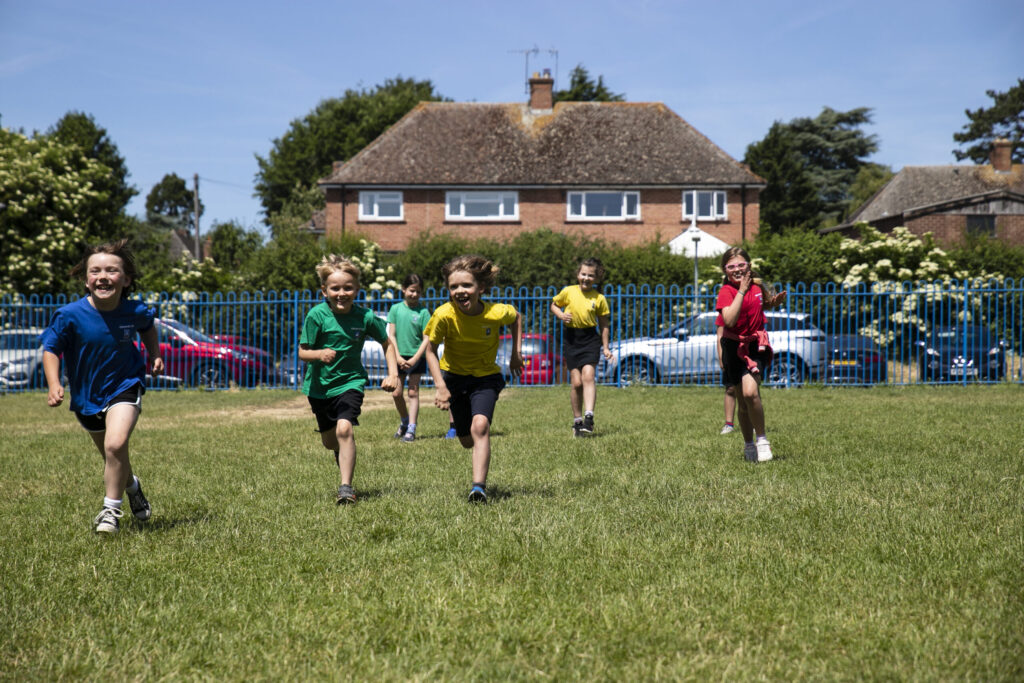
Intent
At Kibworth Primary School we believe all children should have access to a high-quality Physical Education. PE is an integral part of the whole school curriculum. We recognise the benefits high quality PE provision and school sport can give to all pupils. Our PE curriculum aims to ensure that all pupils develop physical literacy and the fundamental knowledge, understanding and skills to excel in a wide range of physical activities, by providing a broad & balanced curriculum with opportunities for all. Our PE curriculum contributes to healthy and active lifestyles; improve emotional well-being, reduce challenging behaviour, increase attendance, and develop key skills such as leadership, confidence, social and team building skills.
Implementation
Our PE curriculum is varied, and long-term plans ensure that we meet the requirements of the National Curriculum. All pupils receive at least two hours of high-quality PE with a qualified sport coach, using the vast outside space or school hall. During these sessions, children receive expert coaching to develop fundamental skills through a variety of activities and games suitable to their key stage.
Our PE curriculum is sequenced precisely to ensure progression of knowledge and skills throughout a child’s primary education, enabling children to build upon prior experiences and apply these fluently, with confidence. Children also have the opportunity to further explore these skills at break clubs, lunch clubs and after school sports clubs. At Kibworth, we endeavour to provide a broad range of activities based on children’s interests and new initiatives.
Inter and intra sports competitions are a particular strength of the school and we would warmly welcome you to admire our collection of trophies. Although we enjoy the competitive nature of sport, we also appreciate and encourage the importance of inclusion and promote positive experiences of being physically active and not always participate to win.
Pupils start their journey in the Foundation Stage and begin to explore fundamental movements, body control and space orientation linked to their everyday tasks and daily routines.
In KS1, they continue to explore wide range of skills, movement and develop team skills which will enable them to progress to more complex activities in KS2.
In KS2 children take part in a range of invasion, striking & fielding, or net & wall games, we promote imagination and creativity in gymnastics and dance as well as provide opportunities for athletics using both indoor and outdoor environments plus outdoor and adventurous activities. Pupils are encouraged to take part in after school clubs and have the opportunity to compete against other schools. In year 4 and year 6, children go on a residential course for outdoor activities. Children also have swimming lessons in year 3 and swim for 4 blocks of 6 weeks.
Physical Education is fundamental in developing healthy lifestyles in young people and we provide a wide array of opportunities to develop this and sporting skills outside of the normal curriculum time. Regular extra-curricular clubs are very popular and offer a wide variety of sports, including Gymnastics, Girls and Boys Football, Fencing, Netball, Dance, Cricket, Rounders, Archery, Golf, Basketball, Rugby and Athletics.
Playtimes are an important part of our pupils being happy, healthy, and ready to learn. We have well-staffed and equipped playgrounds, a sports fields, two adventure playgrounds (one for KS1 and one for KS2), skipping ropes and an Outdoor Area specifically for the EYFS children where children are provided with opportunities for to develop and improve fundamental skills using various body parts.
To develop leadership and communication skills, children in Years 3,4,5 and 6 can apply to become a Sports Ambassador which is a responsible role in encouraging younger children to learn how to play collaborative games, respecting rules and to be as active as possible during playtimes. Children selected are positive role-models for younger members of the school, organising lunchtime games and assisting with annual sports days.
Impact
Children’s progress is monitored by using informal assessments such as observations, evaluating work and questioning children to identify what they have understood. This is tracked using end of unit assessments and recorded to identify which children are working towards age related expectations and those working above. These assessments are made termly, and this information is shared by the sports team with class teachers and reported to parents in end of year assessments.
Pupil voice also plays an essential role in measuring the impact of our PE curriculum across the school. Through pupil interviews, children can reflect on what they have learnt and its impact on their skill development and understanding of healthy lifestyles. These areas work together cohesively to evaluate standards in PE across the school
Key Documents
“If you talk to a man in a language that he understands, that goes to his head. If you talk to him in his own language, that goes to his heart.” –Nelson Mandela
Intent
Learning a foreign language provides a valuable educational, social, and cultural experience and links strongly to our curriculum vision. At Kibworth, we aim to instil in children a love of language that enables them to communicate effectively and confidently with the wider world. As well as this, we hope to create children with the ability to understand, respect and value the amazing cultural differences that can be found across the globe. Ultimately, it is our aim to create citizens who can participate in and contribute valuably to the wider world.
Implementation
At Kibworth CE Primary, we teach French throughout Key Stage 2, providing children with the opportunity to practise listening, speaking, writing, and reading alongside developing their intercultural understanding. Following the National Curriculum, we have developed our own scheme of work where relevant and purposeful French language content is built upon and revisited over the course of the key stage to ensure progression and retention of learning. To aid this, learning is delivered using a range of strategies such as games, songs, pneumonic, chanting, and visual representations.
Impact
To ensure that we know how children’s learning is progressing, at the end of each unit, assessments are conducted to identify strengths and weaknesses in speaking, reading, writing, and listening. This enables teachers to adapt planning to suit the learning needs of the children. In addition, impact of language learning can be seen through children’s engagement in lessons; interest in the content; and curiosity to develop their own learning.
Key Documents
“Music is life itself.”- Louis Armstrong, jazz trumpeter
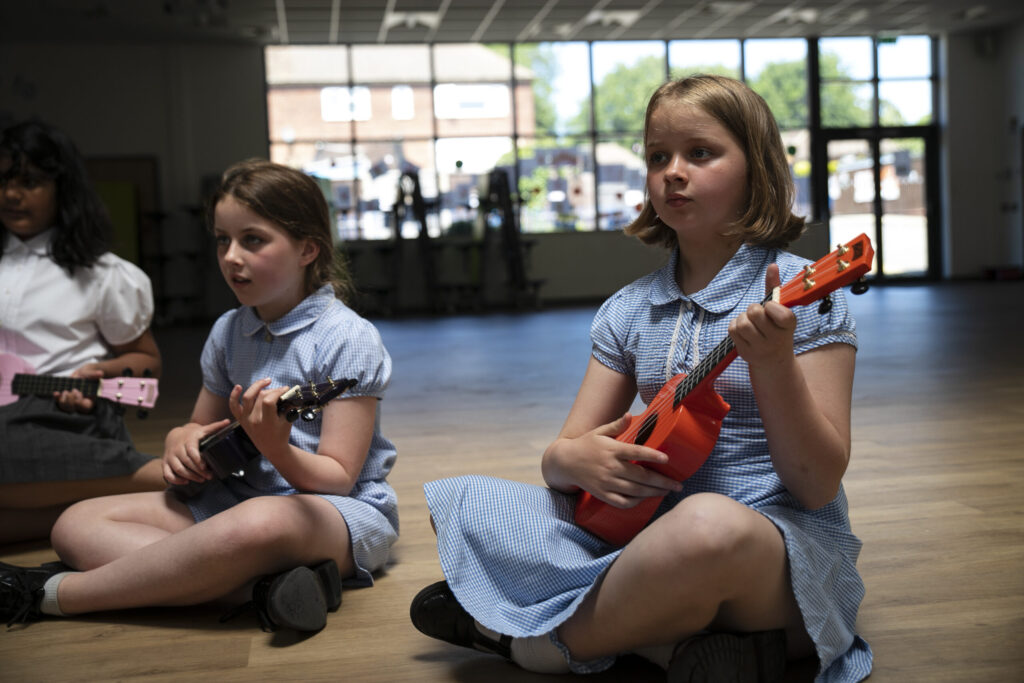
INTENT
We believe that accessible and inclusive music experiences are necessary to develop musicianship skills and support the skills of the wider curriculum and the ethos of the school. We give all children opportunities to listen to music from a variety of time periods, countries, cultures, and styles and develop a love and enjoyment of music. We also encourage children to appraise music, including performances by peers, through meaningful discussions about what they can hear using correct terminology. Singing is an integral part of other school’s community and takes place in collective worship at school and in St Wilfrids Church. We aim to develop children’s confidence and enjoyment by providing them with opportunities to play tuned and un-tuned instruments independently or in an ensemble, to a backing track or in response to a piece of music.
IMPLEMENTATION
Our pupils will learn that music is a universal language that embodies one of the highest forms of creativity. Music lessons will engage and inspire pupils to develop a love of music and develop their talent as musicians, and in turn increase their self-confidence, creativity and sense of achievement. As pupils progress, they should develop a critical engagement with music, allowing them to compose, and to listen with discrimination to a variety of musical examples. Children are exposed to a variety of musical styles during. Teachers ask questions about what the children have heard and give background information to the musical style of the week. We also ensure that children have access to professional musicians and have teachers from Leicestershire Arts teaching regularly whole class instruments together.
EYFS children learn songs developing their sense of pitch and pulse. They then used the music as a stimulus to explore sounds, rhythm, pitch, pulse, duration, texture and timbre.
We also engage with a wide range of professional peripatetic music teachers and offer lessons including guitar, woodwind, brass, and piano.
IMPACT
Children enjoy music and are enthusiastic in developing their musicianship skills. They confidently share their ideas and performances and appraise their own and others work using musical terminology. They are able to use transferable skills and are well prepared for the next stage of their journey. All children improve their musicianship skills and achieve at least age expected standards. Assessment Music assessment is ongoing to inform teachers with their planning, lesson activities and differentiation. Summative assessment is completed at the end of each unit to inform leaders of the improvements or skills that still need to be embedded.
“Play is often talked about as if it were a relief from serious learning. But for children, play is serious learning. Play is really the work of childhood.” – Fred Rogers
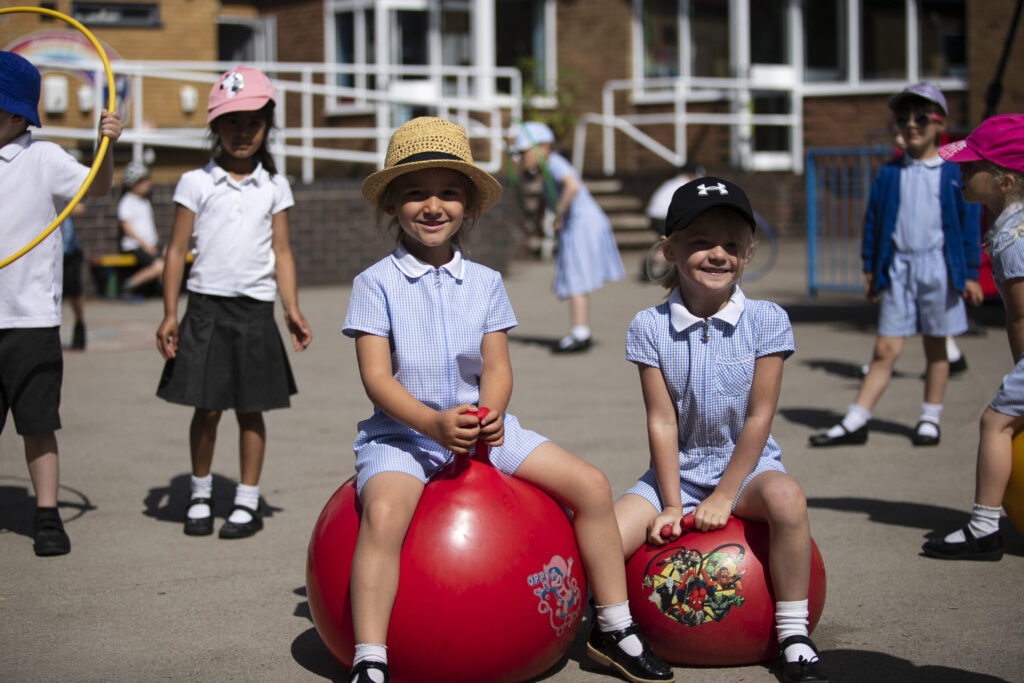
Intent
Our curriculum in Early Years is designed to provide a broad and balanced education that meets the needs of all pupils. It facilitates them to gain the skills, knowledge and understanding, as they start out on their educational journey, supporting them to progress from their individual starting points and preparing them for the next stage of their education.
Our ethos in Early Years is to support children’s personal, social, and emotional development so that they feel safe and secure and are ready to learn.
Through the seven areas of learning we provide topics that excite and engage children, building on own interests and developing their experiences of the world around them. We recognise that all children come into our setting with varied experiences and all staff work hard to ensure that the learning opportunities provided widen their knowledge and understanding of the world, setting ambitious expectations for all children.
The curriculum celebrates diversity and supports the pupils’ spiritual, moral, social, and cultural development. Those children with particular needs, including SEND and EAL are supported appropriately allowing them to be successful.
Implementation
At Kibworth, we offer a curriculum which builds on the knowledge, understanding and skills of all children, whatever their starting points. We follow the Early Years curriculum using topic themes and enrichment opportunities. The children’s interests are also used to help shape our curriculum.
The aim of our curriculum is to develop a thirst and love for learning by:
We recognise the changing needs and interests of our pupils, and we are responsive to this, regularly developing existing topics.
In Foundation Stage, the children have a Literacy and Maths whole class taught session 4 times a week and a daily Phonics session. Each child will have an adult led Literacy and Maths activity weekly. In addition, the children have whole class weekly PE, ICT, RE, PSHE and Music lessons.
Outside of whole class and guided group work the children are engaged in continuous provision. continuous provision provides resources, questions and opportunities for self-directed learning and play that builds upon prior learning.
In English we use high quality texts as a basis for Literacy planning. The texts have been carefully chosen with a view to promoting reading for pleasure and linking in with current topics. We also use Talk for Writing techniques to help develop the children’s literacy skills through the imitation of stories and use of actions.
Phonics is taught daily. We follow the ‘Little Wandle Revised Letters and Sounds’ programme. The ‘Liltte Wandle’ keep up programme is also used alongside our daily phonics lessons to help close the gaps in learning for key focus pupils and ensure no child falls behind.
The maths curriculum is taught through dedicated sessions. These sessions are carefully planned to promote early number sense using the fours C’s: counting, comparison, cardinality, and composition. This starts with mastering numbers 0-5 and then progresses through to 0-10. We want our children to become confident mathematicians who can problem solve and apply what they have learnt to real life experiences.
Impact
Children demonstrate high levels of engagement in activities, developing their speaking and listening skills, enabling them to access more areas of the learning and communicate to both adults and children. Children develop skills across all areas of the curriculum including literacy, mathematics and physical development using these in different ways.
Children have developed a wider sense of the world around them and can draw on these experiences during interactions with others and link this to new learning.
Children develop their characteristics of effective learning and are able to apply their knowledge to a range of situations making links and explaining their ideas and understanding. Children are confident to take risks and discuss their successes and areas for development with adults, drawing on their experiences to improve or adjust what they are doing.
Key Documents
EYFS progression maps
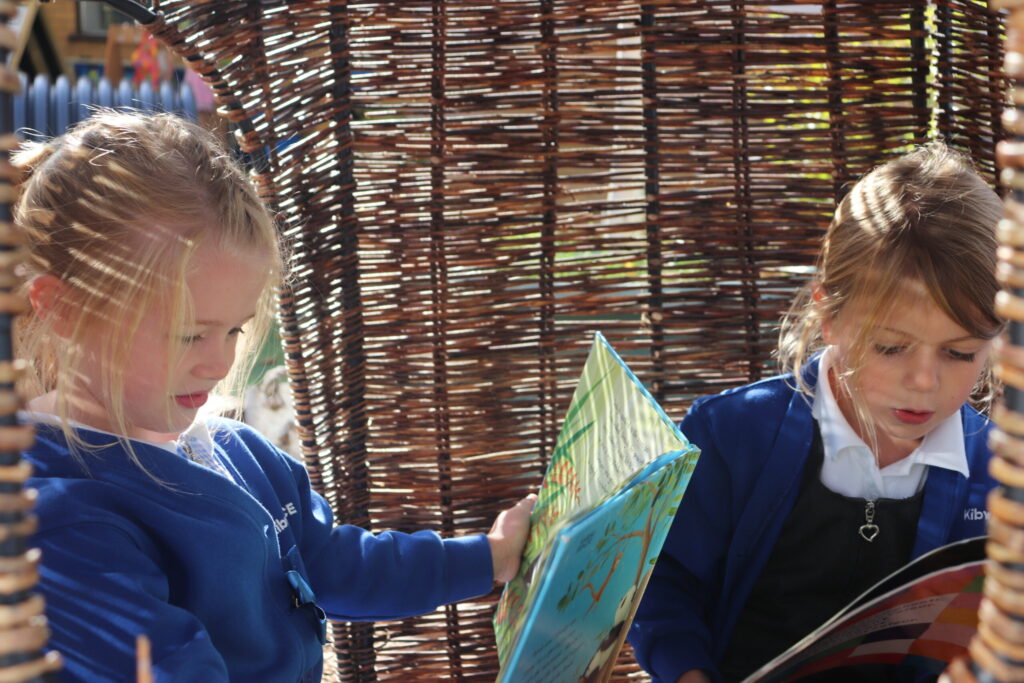
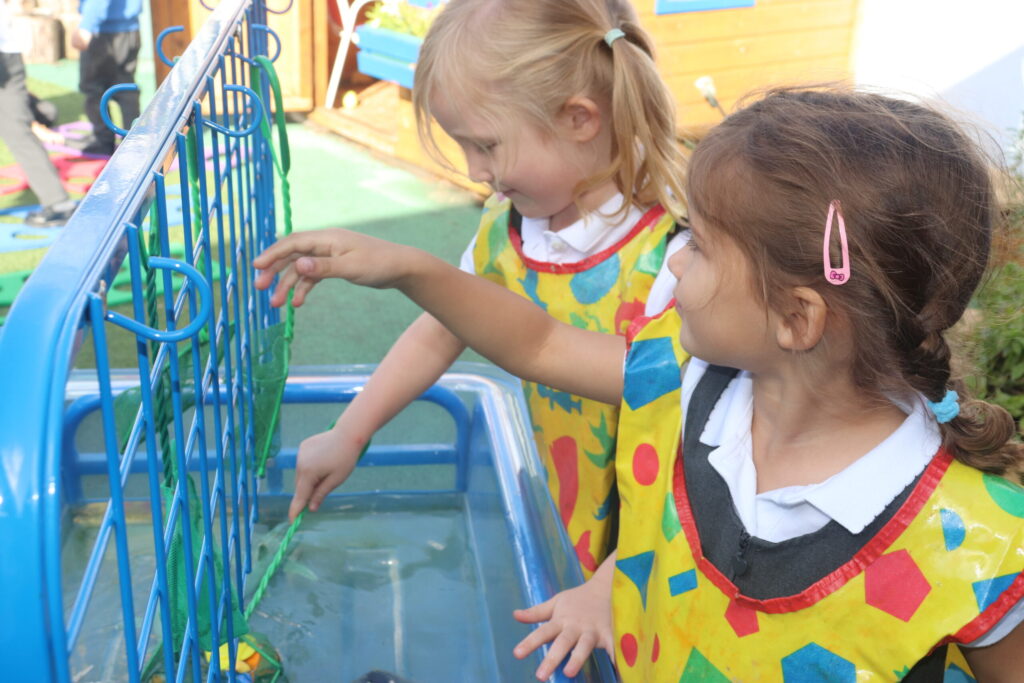
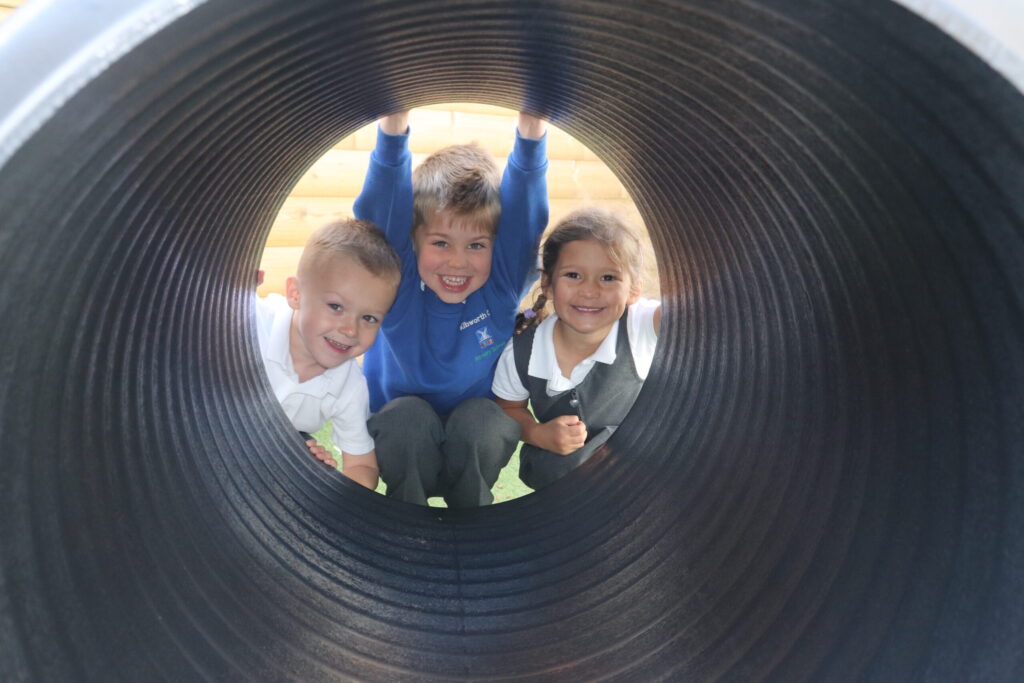
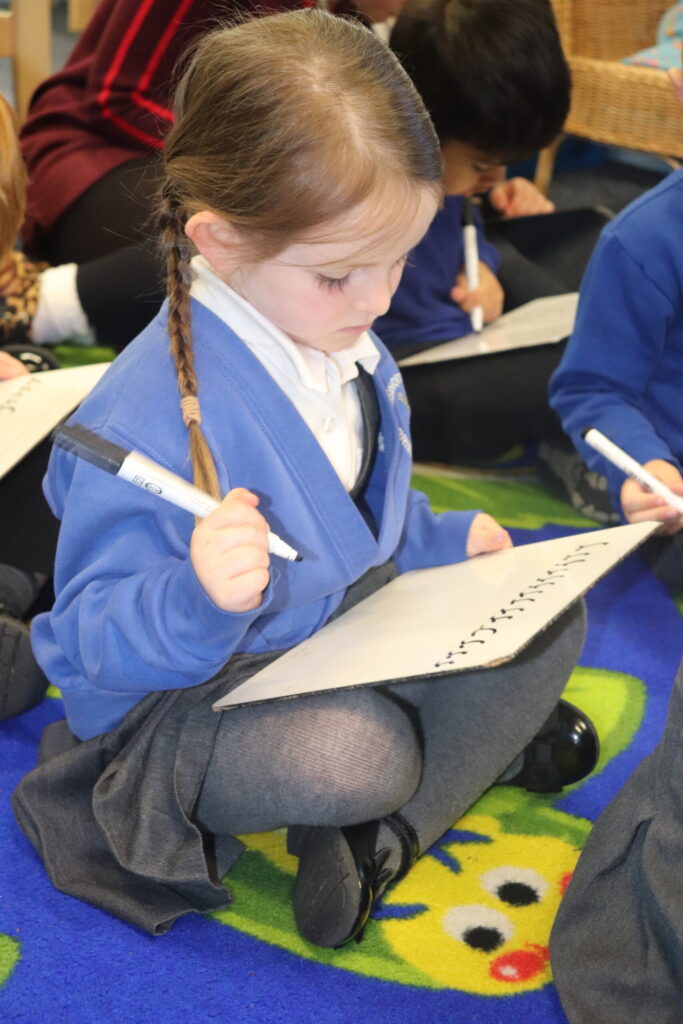
“Compassion and tolerance are not a sign of weakness, but a sign of strength.” – Dalai Lama
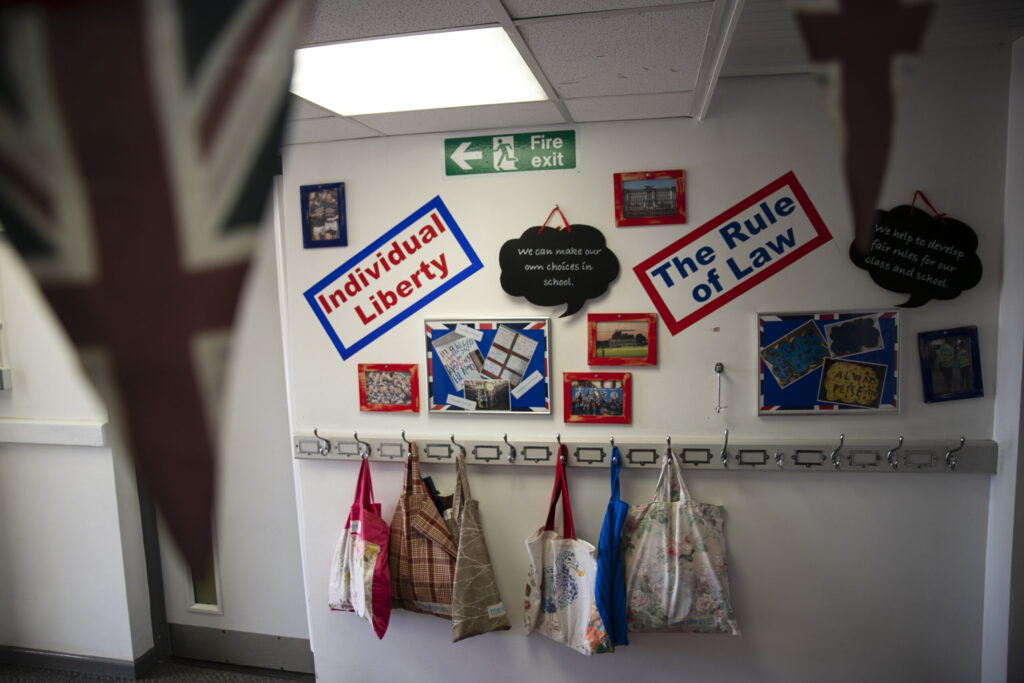
Intent
As part of British Values at Kibworth C of E, we promote ‘British Values’ through our broad and balanced curriculum. At Kibworth we have a set of values that nurture positive behaviour and diversity. The staff in the school promotes these values through being good role models.
Implementation
British values are taught through our PSHCE, History and RE curriculum. Aspects of British Values are also covered in the regular worships that take place. British values are also covered on a daily basis as children are always listened to and responded to by adults. They are taught to listen carefully and with concern to each other, respecting the right of every child to have their opinions and voices heard. We have a set of school rules that are followed, and they are rewarded for good behaviour and taught about the consequences when rules are broken. We continually strive to work in an environment that is inclusive, fair, and democratic.
Impact
The children are encouraged to be the best they can be. They respect their peers and the staff in the school. Through the values taught at Kibworth children are being shown how to be valuable and respected citizens. We have a student council that will teach the children the process of democracy and what it is to live in a fair society. Through the teaching of history, RE and PSHCE which includes aspects of British Values children learn that rules and laws are important.
The children behave well at Kibworth and are respectful to each other and to the adults around them.
Key Documents